
"Old Folks at Home" is a folk song written by Stephen Foster in 1851. Since 1935, it has been the official state song of Florida, although in 2008 the original lyrics were revised. It is Roud Folk Song Index no. 13880.

"Carolina in the Morning" is a popular song with words by Gus Kahn and music by Walter Donaldson, first published in 1922 by Jerome H. Remick & Co.

"Shine On, Harvest Moon" is a popular early-1900s song credited to the married vaudeville team Nora Bayes and Jack Norworth. It was one of a series of moon-related Tin Pan Alley songs of the era. The song was debuted by Bayes and Norworth in the Ziegfeld Follies of 1908 to great acclaim. It became a pop standard, and continues to be performed and recorded in the 21st century.

"Pretty Baby" is a song written by Tony Jackson during the Ragtime era. The song was remembered as being prominent in Jackson's repertory before he left New Orleans in 1912, but was not published until 1916.

"If You Were the Only Girl (In the World)" is a popular song, composed by Nat D. Ayer with lyrics by Clifford Grey. It was written for the musical revue The Bing Boys Are Here, which premièred on 19 April 1916 at the Alhambra Theatre in Leicester Square, London. The song was originally performed as a duet between Lucius Bing, played by George Robey, and his love interest Emma, originated by Violet Loraine.

"Moonlight Bay" is a popular song. It is commonly referred to as "On Moonlight Bay". The lyrics were written by Edward Madden, the music by Percy Wenrich, and was published in 1912. It is often sung in a barbershop quartet style. Early successful recordings in 1912 were by the American Quartet and by Dolly Connolly.

"By the Light of the Silvery Moon" or "By the Light of the Silv'ry Moon" is a popular love song. The music was written by Gus Edwards, and the lyrics by Edward Madden. The song was published in 1909 and first performed on stage by Lillian Lorraine in the Ziegfeld Follies of 1909. It was one of a series of moon-related Tin Pan Alley songs of the era. The song was also used in the short-lived Broadway show Miss Innocence when it was sung by Frances Farr.
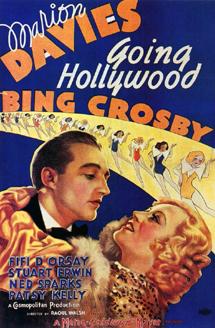
Going Hollywood is a 1933 American pre-Code musical film directed by Raoul Walsh and starring Marion Davies and Bing Crosby. It was written by Donald Ogden Stewart based on a story by Frances Marion. The film was released by Metro-Goldwyn-Mayer on December 22, 1933.

"My Melancholy Baby" is a popular song published in 1912 and first sung publicly by William Frawley. The music was written by Ernie Burnett (1884–1959), the lyrics by George A. Norton.
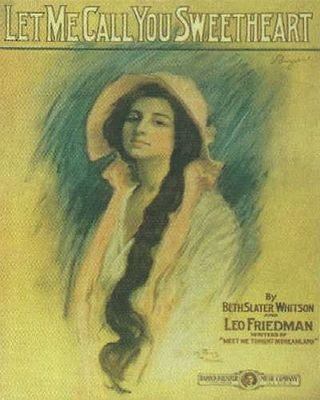
"Let Me Call You Sweetheart" is a popular song, with music by Leo Friedman and lyrics by Beth Slater Whitson. The song was published in 1910 and was a huge hit for the Peerless Quartet in 1911. A recording by Arthur Clough was very popular the same year too. A 1924 recording identifies a Spanish title, "Déjame llamarte mía".

Beth Slater Whitson was an American lyricist.
Leo Friedman was an American composer of popular music. Friedman was born in Elgin, Illinois and died in Chicago, Illinois. He is best remembered for composing the sentimental waltz "Let Me Call You Sweetheart" with lyrics by Beth Slater Whitson in 1910. Another popular composition was "Meet Me Tonight in Dreamland."

Star Spangled Rhythm is a 1942 American all-star cast musical film made by Paramount Pictures during World War II as a morale booster. Many of the Hollywood studios produced such films during the war, with the intent of entertaining the troops overseas and civilians back home and to encourage fundraising – as well as to show the studios' patriotism. This film was also the first released by Paramount to be shown for 8 weeks.
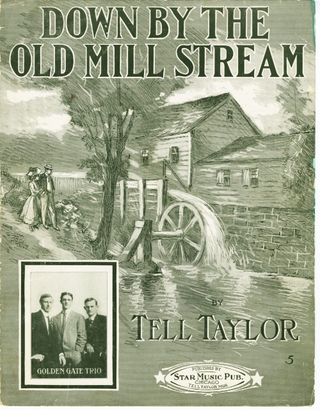
"Down by the Old Mill Stream" is a song written by Tell Taylor. It was one of the most popular songs of the early 20th century. The publisher, Forster Music Publisher, Inc., sold 4 million copies.

"Way Down Yonder in New Orleans" is a popular song with music by John Turner Layton Jr. and lyrics by Henry Creamer. First published in 1922, it was advertised by Creamer and Layton as "A Southern Song, without A Mammy, A Mule, Or A Moon", a dig at some of the Tin Pan Alley clichés of the era.

"In the Good Old Summer Time" is an American Tin Pan Alley song first published in 1902 with music by George Evans and lyrics by Ren Shields. The song is in the public domain.

Too Much Harmony is a 1933 American black-and-white pre-Code musical film directed by A. Edward Sutherland and starring Bing Crosby, Jack Oakie, Richard "Skeets" Gallagher, Harry Green, and Judith Allen. It was released by Paramount Pictures.
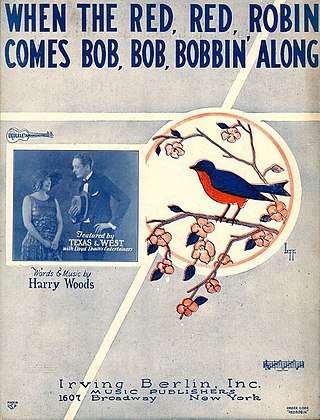
"When the Red, Red Robin " is a popular song written, both words and music, by Harry Woods in 1926. The song became the signature song for singer and actress Lillian Roth, who performed it often during the height of her musical career from the late 1920s to the late 1930s.
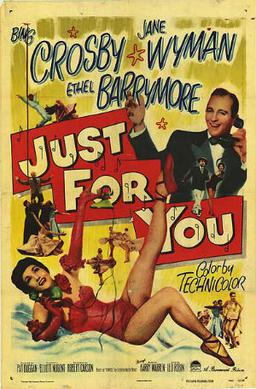
Just for You is a 1952 American musical film starring Bing Crosby and Jane Wyman and the final motion picture to be directed by Elliott Nugent. It was nominated for Best Song at the 1953 Academy Awards. The film was based on the book Famous by Stephen Vincent Benét. Filming took place between October 22 and December 20, 1951. It is said that Judy Garland had originally been sent a script as she was being considered for the female lead, but she apparently decided not to proceed with the project. Location scenes were filmed at Lake Arrowhead, near San Bernardino, California and at Big Bear Lake in the San Bernardino National Forest.

"Sweet Sue, Just You" is an American popular song of 1928, composed by Victor Young with lyrics by Will J. Harris. Popular versions in 1928 were by Earl Burtnett and by Ben Pollack.


















